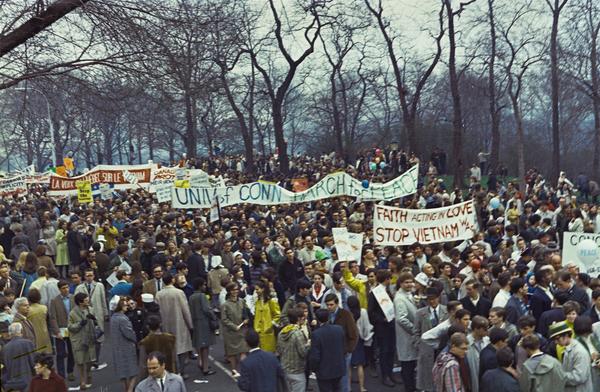
Howard S. Goldbaum Collection of Connecticut Daily Campus Negatives.
The following essay is an extended closing remark to the exhibition Day-Glo and Napalm: UConn from 1967-1971, by guest curator and contributor, George Jacobi (’71).The exhibition runs until Friday, October 25th, 2019.
Thanks to the GI Bill, the Fifties are a favorable time for most Americans home from the war to build a career and raise a family. Powered by Unions as well, the rise of the largest middle class in history finally includes some Black and Latino citizens. Suburbia is invented. The 1964 World’s Fair in New York promises we’ll all be working far fewer hours and getting there in a flying car, asserting that technology only benefits mankind. Robots will do the tough jobs. The future seems so far away that this is almost believable. Are white kids in New England spoiled? Compared with previous generations, sure we are, and so has each generation since. Growing up then is generally benign, and the result is a chance to examine ourselves and America with less national responsibility than our parents. Our patriotism thus leans toward social betterment, not defense or personal economic progress.
Under the veneer of white middle-class American life rumblings of unrest have begun. Academics are suggesting that modern society is unfulfilling. Rachel Carson has shown America that it is in the process of killing nature with chemicals. Kerouac has been “On the Road” and Jackson Pollock has blown up the art world. Jazz has turned from big band dance music into individual expression. Ginsburg writes “Howl” and thus comes out as a gay man; the book is immediately banned. Yet in Greenwich Village people are “suddenly free of the shackles, the baggage of tradition”: Liam Clancy. Nevertheless, beatniks are portrayed as a joke on TV. The political and cultural events that took place at UConn during the years 1967 to 1971 of course reflect wider American historical forces. For simplicity, label these Politics, Spirituality, Culture, and the Arts. In reality, they are jumbled together; breaking them down in order to clarify each is a rare side benefit of the passage of time.
The following account lists this history, phenomena that took place or began prior to 1967. By that year, society is increasingly seen by an influential youth minority as hypocritical or empty of value. It has become apparent that the norms are mythological and serve only the powerful. Alienation results with what is initially a quiet insurrection against uncritical acceptance of the status quo. While most of the country isn’t paying attention, there is a cultural shift; all of a sudden something changes. Several small groups at first, an anti-establishment minority slowly appears. Most folks in America and at UConn in the mid-1960s go about their own lives whether they are sympathetic to this rebellion or not. A majority of UConn students, including us, will spend most of our hours being students.
Continue reading